Shakespeare In Love
Information
- Date
- 9th March 2022
- Society
- Pranksters Theatre Company
- Venue
- The Electric Theatre, Guildford
- Type of Production
- Play
- Director
- Jenny Swift
The play tells of a fictional love affair between Will Shakespeare and a young would-be actor, Viola de Lesseps aka Tom Kent. At the time Shakespeare was suffering from Writer’s Block during the writing of Romeo and Juliet. Several characters are based on historical figures, such as theatre owners, and many of the characters, lines and plot devices relate to Shakespeare’s plays or other dramas of the time.
A one-sheet programme with cast list, acknowledgements, and details of the production team was presented in the form of a scroll. A very nice idea.
The set was Tudor beamed, with a central curtain revealing at the appropriate moment Viola’s bed, at other times used for the entrance of Lord Chancellor Tilney, or the Queen’s entourage. A strange looking torture instrument was on stage at the start. Various large trunks or boxes were in evidence, and some benches. Then, of course, there was Spot the Dog, a very shaggy and realistic seeming Old English Sheepdog, I believe, created by the Pranksters talented model maker Sam Weems, and operated by Philip Hutchinson. Lighting and sound were used to good effect throughout. The music was appropriate and made a very pleasant backdrop to much of the proceedings.
There were some splendid and colourful Tudor costumes, especially for the theatre owners Fennyman and Burbage, the actor Ned Alleyn, and the Queen and her ladies in waiting. Viola, as Tom Kent, also looked very fine, as did Lord Wessex and Lord Chancellor Tilney. Many people were sporting marvellous footwear with large buckles and huge tongues.
This was a lively, action-packed production. High praise indeed must go to Philip Hutchinson, who had to step in at short notice as Lord Wessex, when the original Wessex came down with Covid. He gave a spirited performance, and was excellent in the part, totally believable.
Jeremy Gooding, too, was good as the young Shakespeare, and it seemed rather amusing to see the Bard struggling to come up with meaningful lines, both for his sonnets and his plays. His friendship with Kit Marlowe (Dean Brewer), and indeed almost his dependence on Kit for inspiration when his mind was blocked was interesting. Both played their parts well.
The interaction between the owner of the Rose theatre, Philip Henslowe (Mark Ashdown) and Hugh Fennyman (Ian McShee) who financed the productions the Rose put on was interesting. Fennyman was owed money by Henslowe, so used rather nasty torture tactics to ‘encourage’ him to pay up. Later, to keep Fennyman on side, he is offered a small part in Shakespeare’s new Romeo and Juliet, as the apothecary. He goes crazy at the idea of being an actor, and of course overacts terribly.
Richard Burbage (Oli Bruce) is an actor who also owns the Curtain Theatre. He is a rival to Henslowe and gets very angry when Henslowe is given Shakespeare’s new play to put on. Robust performances from these three impresarios.
Ned Alleyn (Olly Clifford) was one of the great London actors of his day, and is hired to play the role of Mercutio. Clifford imbued him with a strong personality and had the necessary stage presence to suggest his success at that time.
Phil Snell played the Master of the Revels, Lord Chancellor Tilney, to perfection, looking fine in his marvellous garments and hat, banging his staff angrily on the ground and yet desperate not to offend the Queen in any way. Mr Snell can always be relied upon, in my experience, to make the very best of his roles.
Queen Elizabeth (Anne Leggett) evidently loved the theatre and also dogs, hence the inclusion of Spot the Dog, who was handled very adroitly by the amazing Philip Hutchinson. Once or twice, there was too much fidgety movement on the part of the dog that distracted from the important dialogue going on centre stage.
Mr Wabash the tailor was owed money by Henslowe, and to appease him, Henslowe offered him too a part in the play. Wabash spoke with a stutter and worked very hard to present the speech at the start of Romeo and Juliet. All on stage were silently willing him on. Good performance by Jon Young, a moving scene this.
Viola de Lesseps was the daughter of a wealthy gentleman. Her father wished her to marry a Lord, so promised her to the impecunious, arrogant, and much older Lord Wessex. She, however, adored plays and poetry, and longed to go on the stage, which at the time was not allowed for women. She disguised herself as a young man with a moustache and manly gait and went to audition for a part in the play. Obviously, the playwright and this young lady subsequently fell in love, Shakespeare was inspired by this love, writer’s block vanished. Emily Rawlinson conveyed the young girl’s enthusiasm, brightness of youth, astonishment at being loved by the great man, recklessness, and sense of duty towards her father and his ambition for her, to perfection.
Alex Gold played the young lad John Webster with great panache, as an annoying chirpy cockney chappie, always hanging around the theatre, later a very interfering one who betrayed the young lovers.
The ball scene at Viola’s parents’ house was well done, as were the slick fight scenes.
A well-directed, interesting production this, intriguing for me to discover later who was real, who was an imaginary character. A great evening’s entertainment.
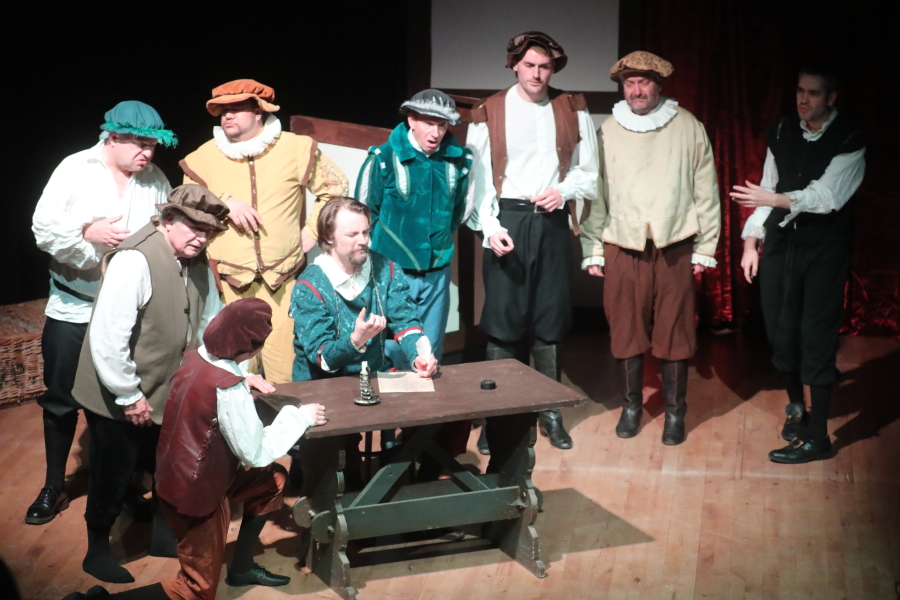 |
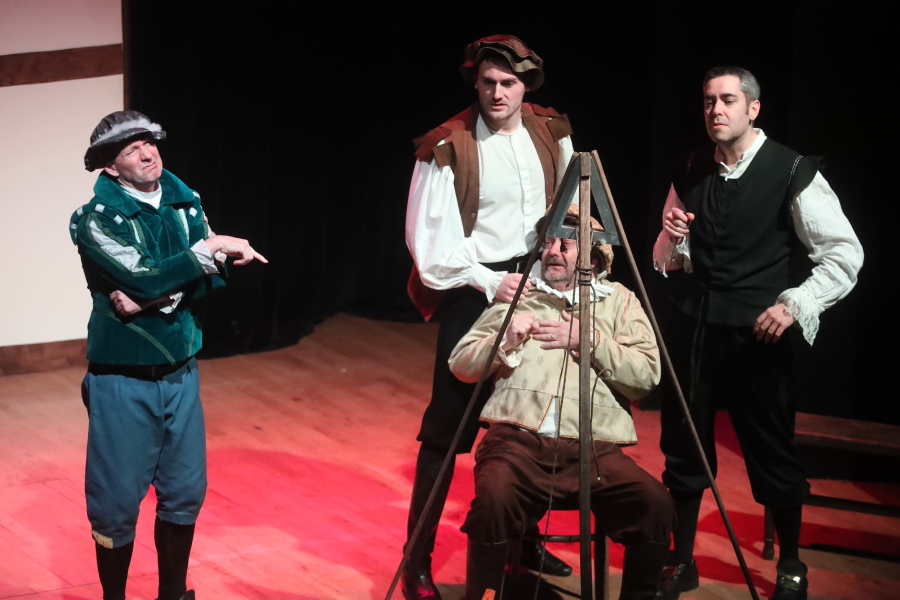 |
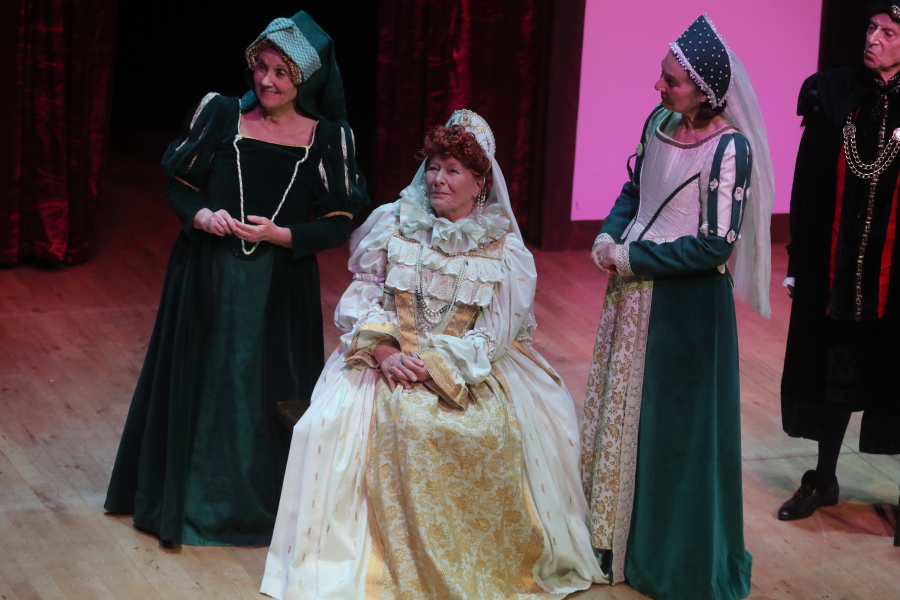 |
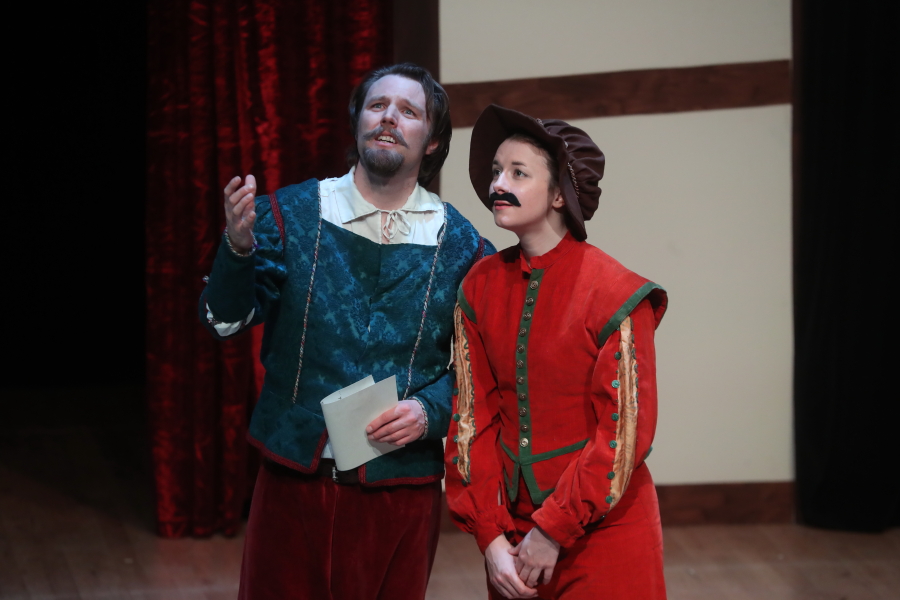 |
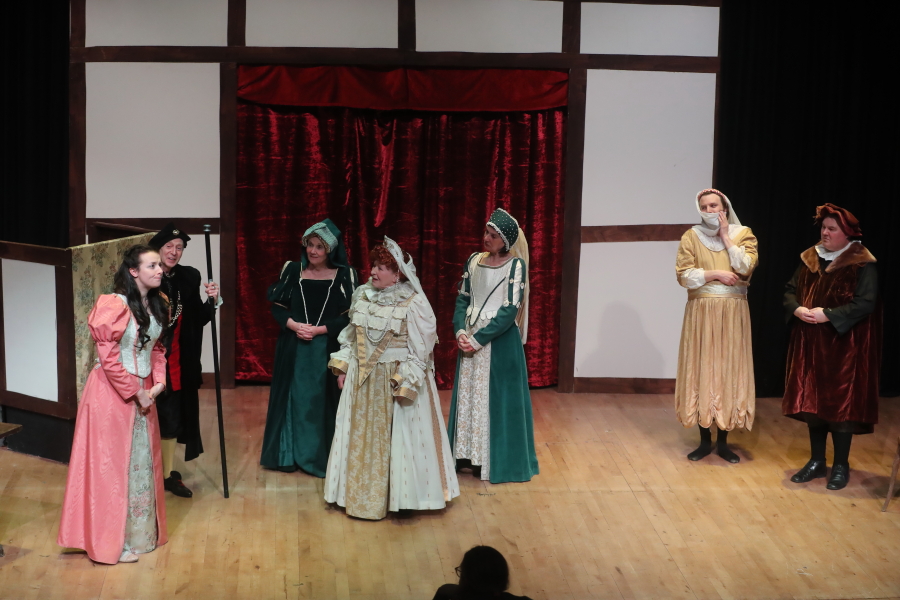 |
|
© NODA CIO. All rights reserved.

 Show Reports
Shakespeare In Love
Show Reports
Shakespeare In Love